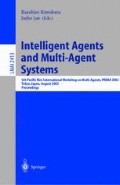Abstract
This paper presents a contribution towards rigourous reasoning about negotiating agents. First, it defines formal models for negotiation and negotiating agents. These models enable to specify the relations between the concepts of plan, plan proposal and resource allocation, on the one hand, and concepts of knowledge, belief and capability, on the other hand. Second, it provides a structured negotiation language enabling to specify primitives, protocols and processes of negotiation. This language is defined by a precise syntax, and it is formally interpreted using a transition system leading to an operational semantics for negotiating agents.
Access this chapter
Tax calculation will be finalised at checkout
Purchases are for personal use only
Preview
Unable to display preview. Download preview PDF.
References
BdL+00._M. Beer, M. d’Inverno, M. Luck, N. Jennings, C. Preist, and M. Schroeder. Negotiation in multi-agent systems. Knowledge Engineering Review, 200.
M. Barbuceanu and M.S. Fox. A language for describing coordination in mas. In International Conference on Multi-Agent Systems, 1995.
J.A. Bergstra and J.W. Klop. Process algebra for synchronous communication. Information and Control, (60):109–137, 1984.
W. Chainbi, A. Ben Hamadou, and M. Jmaiel. A belief-goal-role theory for multiagent systems. International Journal of Pattern Recognition and Artificial Intelligence, 15(3):1–16, 2001.
E. H. Durfee and V. Lesser. Negotiating task decomposition and allocation using partial global planning. Distributed Artificial Intelligence, 2(1):229–244, 1989.
J. Engelfriet, C. M. Jonker, and J. Treur. Compositional verification of multi-agent systems in temporal multi-epistemic logic. In Proceedings of fifth International Workshop on Agent Theories, Architectures, and Languages (ATAL98), volume 1544 of Lecture Notes in Artificial Intelligent, Heidelberg, 1999.
J. Ferber. Les systèmes multi-agents. Vers une intelligence collective. InterEdition, 1995.
T. Finin and R. Fritzson. Kqml: a language and protocol for knowledge and information exchange. In Proceedings of the Thirteenth International Workshop on Distributed Artificial Intelligence, pages 126–136, Lake Quinalt, WA, July 1994.
FIPA. Agent communication language. In Specification FIPA, 1997.
P. Faratin, C. Sierra, and N. R. Jennings. Negotiation decision functions for autonomous agents. International journal of robotics ans autonomous systems, 24(3–4):159–182, 1998.
A. Hadj-Kacem and M. Jmaiel. A formal negociation model for cooperating agents. In Proceedings of the AAAI Workshop on Negotiation Methods for Autonomous Cooperative Systems, North Falmouth, Massachusetts, USA, November 2001.
C.A.R. Hoare. Communicating Sequential Processes. Prentice Hall International, 1985.
S. Kraus, N. Nirkhe, and K. Sycara. Reaching agreements through argumentation: a logical model and implementation. Artificial Intelligence Journal, 104(1–2):1–69, 1998.
S. Kraus. Beliefs, time and incomplete information in multiple encounter negotiations among autonomous agents. Annals of Mathematics and Artificial Intelligence, 20(1–4):111–159, 1997.
S. E. Lander and V.R. Lesser. Understanding the role of negociation in distributed search among heterogeneous agents. In Proceedings of the thirteen International Joint Conference on Artificial Intelligence, pages 438–444, Chambéry, August, 22–24 1993.
H. J. Müller. Negotiation principles. John Wiley & sons, England, 1996.
R. Milner. A Calculus for Communication Systems, volume 90 of Lecture Notes in Computer Science. Springer, Berlin, 1980.
N. Matos, C. Sierra, and N.R. Jennings. Determining successful negotiation strategies: an evolutionary approach. In Proceedings of the Third International Conference on Multi-Agent Systems (ICMAS-98), pages 182–189, Paris, France, 1998.
S. Park and W. P. Birmingham. Toward a unified framework for multiagent negotiation. In Proceedings of the international Conference on Intelligent Computer Communication, pages 105–122, 1995.
G. D. Plotkin. A Structural Approach to Operational Semantics. Technical Report DAIMI FN-19, University of Aarhus, 1981.
S. Parsons, C. Sierra, and N.R. Jennings. Agents that reason and negotiate by arguing. Journal of Logic and Computation, 8(3):261–292, 1998.
Y. Shoham. Agent-oriented programming. Journal of Artificial intelligence, 60:51–92, 1993.
Author information
Authors and Affiliations
Editor information
Editors and Affiliations
Rights and permissions
Copyright information
© 2002 Springer-Verlag Berlin Heidelberg
About this paper
Cite this paper
Jmaiel, M., Kacem, A.H. (2002). An Operational Semantics for Negotiating Agents. In: Kuwabara, K., Lee, J. (eds) Intelligent Agents and Multi-Agent Systems. PRIMA 2002. Lecture Notes in Computer Science(), vol 2413. Springer, Berlin, Heidelberg. https://doi.org/10.1007/3-540-45680-5_6
Download citation
DOI: https://doi.org/10.1007/3-540-45680-5_6
Published:
Publisher Name: Springer, Berlin, Heidelberg
Print ISBN: 978-3-540-44026-0
Online ISBN: 978-3-540-45680-3
eBook Packages: Springer Book Archive

